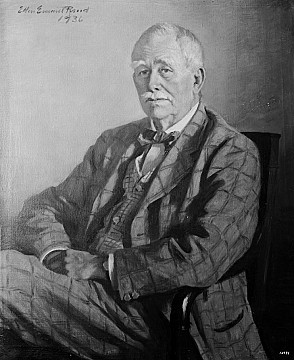Richard Aldrich (1863-1937)
Richard Aldrich, Music Critic for 'The New York Times'
He was born at Providence, Rhode Island, and was a brother of the architect Chester H. Aldrich, of Delano & Aldrich. He studied music at Harvard and then in Germany. His started his journalistic career on the staff of The Providence Journal before serving two years (1889-1891) as private secretary to the Republican Senator from Rhode Island, Nathan Dixon III. Having then been assistant music critic at The New York Tribune, in 1902 he was appointed the music critic for The New York Times, for which he was best known: "Mr. Aldrich was neither an extremist nor a dyed-in-the-wool conservative. Though frank and positive in expressing dissatisfaction, he was eminently fair and endeavored to bring out favourable points... He was invariably impersonal and judicious in the wording of his judgments and he managed with a combination of tact and humor to inject advice to artists". He owned, "one of the finest private music libraries" in America and in 1928 published Musical Discourse.
During World War One, he was stationed in Washington D.C. as a Captain with the U.S. Military Intelligence Division. In 1906, he married one of the "Astor Orphans" Margaret Livingston Chanler and they divided their time between Manhattan and her childhood home, Rokeby. They were the parents of two children and Rokeby remains in their family today. He died at his brother's home, the Villa Aurelia in Rome, Italy. His portrait can still be seen in the Loeb Music Library at his alma mater, Harvard University.
During World War One, he was stationed in Washington D.C. as a Captain with the U.S. Military Intelligence Division. In 1906, he married one of the "Astor Orphans" Margaret Livingston Chanler and they divided their time between Manhattan and her childhood home, Rokeby. They were the parents of two children and Rokeby remains in their family today. He died at his brother's home, the Villa Aurelia in Rome, Italy. His portrait can still be seen in the Loeb Music Library at his alma mater, Harvard University.





